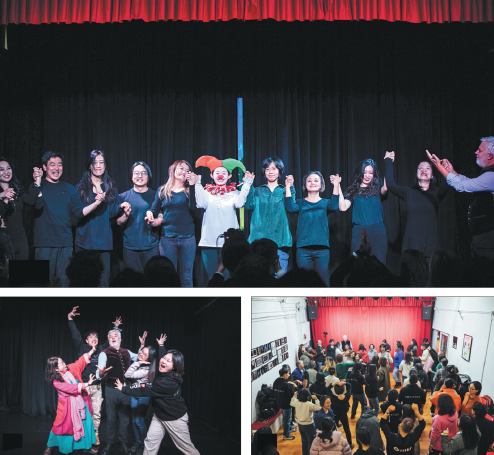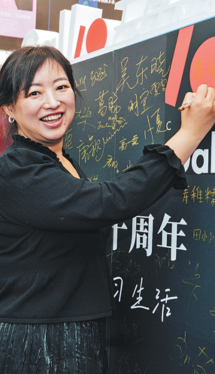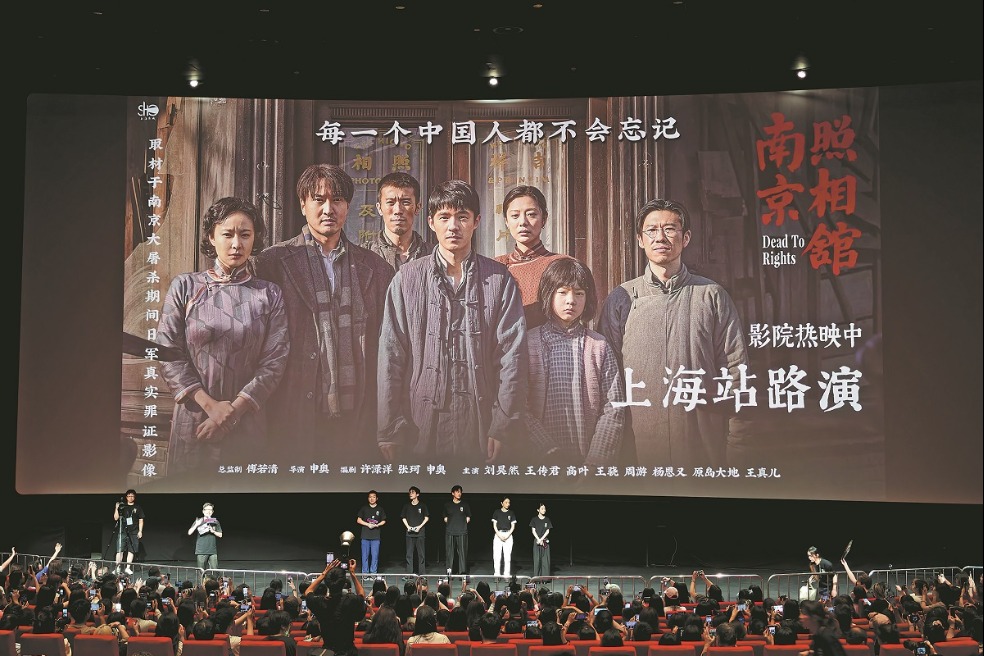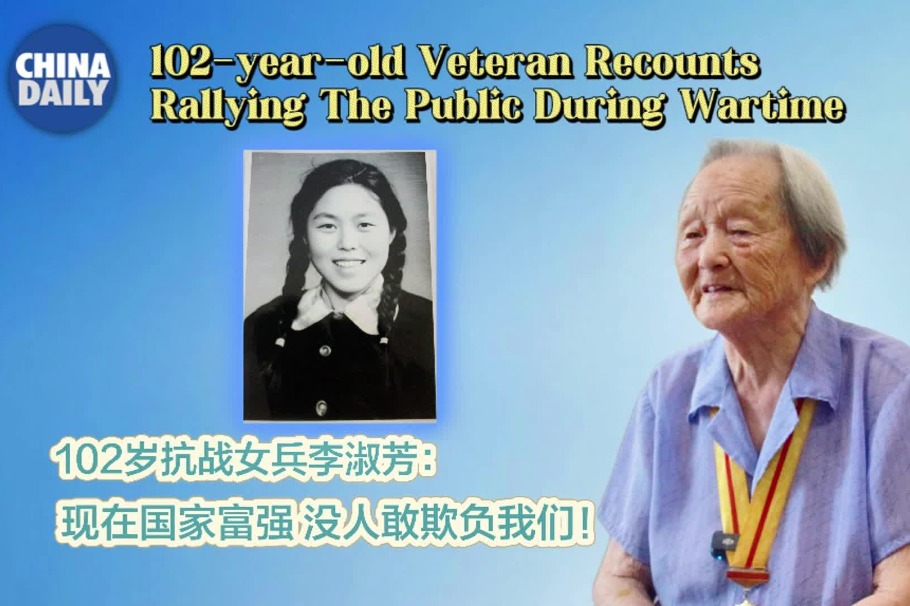Issues raised by theater group see audience get in on the act
Performers challenge those watching to confront important topics, Cheng Yuezhu reports.

A recent performance of Galli Theater's production Falltur (trapdoor) in Beijing ended with a rare scene — some audience members took to the stage to give a group hug to the protagonist, while others were reduced to tears.
In the play, the protagonist walks along a cliff and thinks about ending her own life, when a clown shows up and tells her to fall through the trapdoor to discover the truth about herself.
The protagonist then faces four levels of trials.
While she manages to face up to the hidden sides of her own personality and various temptations from the outer world, she fails to pass the last test, and the clown says, only when others are willing to stand by her side, can she have a second chance to live her life to the full.
The play is a piece of prevention theater by Galli Theater, an organization founded by German actor and playwright Johannes Galli that offers training in theater education and drama therapy.
"Every time I perform onstage, it's like an experience of cleansing my soul. Even though I know there is hope in the end, I still feel a sense of despair when the protagonist fails to pass the test," says the performer taking the role of the protagonist, Chen Biwen, better known as Beer.
"But the protagonist chooses not to give up and asks the clown for help. My interpretation is that the clown could be someone around us, or simply ourselves. Our own decisions might lead us to despair, but we can also find hope on our own."
The play embodies the Galli Method proposed by Johannes Galli, with the "seven cellar kids" theory at its foundation. Galli envisions seven playful figures that represent an individual's personality traits, such as arrogance, irritability and tendency to gossip.
Many of the theater's productions or workshops involve acting out these roles, during which the performers get to pay attention to these sides of their own personalities. They might be factors that lead to undesirable life situations, but by confronting them, the performers learn to embrace these sides of who they are and transform them into newfound strengths in real-life scenarios.
For example, arrogance can be transformed into leadership, irritability can urge someone to put things into action and improve their efficiency, and gossiping allows a person to understand and empathize with other people.
"Johannes Galli leaves the audience with two options in the play — either leave the protagonist alone, or take over the task of detecting those characteristics within ourselves," says Galli Theater's international manager, Michael Wenk.
"He built a bridge between the actors and the audience. For the protagonist alone, there is no hope, but when we join in, her suffering makes sense, and the questions are posed to us."
Wenk came to Beijing in November to attend events marking the 10th anniversary of the theater's China branch. The anniversary events included six lectures given by experts in psychology and drama therapy, three theater workshops, five prevention plays and five sharing sessions by their production crews.
Themes of these events cover issues, including depression and anxiety, teenage behavior, addiction, bullying, test anxiety, interpersonal relations and gender issues, aiming to present Galli Theater's work in applying theater to everyday life, hence improving mental health and interpersonal relationships.
"Galli Theater's prevention plays comprise two parts, the demonstration and the performance. First, we as performers act out the play for the audience members, and then they are encouraged to perform by themselves on the stage," says Gao Xuan, founder of Galli Theater China.
"Usually these productions center on social issues the audience members are concerned about, such as violence, addiction or gender issues. We present these issues onstage, but in a comedic way, so that the audience can relate to the problems in a relaxing atmosphere. The plays will also discuss the causes and possible solutions for these problems."
Gao first encountered Galli Theater back in 2000, when she was a student at the Ludwig Maximilian University of Munich in Germany. In search of a part-time job, she saw a tear-off flyer for the Galli Theater at the university canteen and applied for a position there.
"The Galli Method exerted a tremendous influence on my life. I became more adept at handling my own life and relationships," Gao says.
"I was studying education and psychology, both of which involve interacting with people. I often felt that I could not apply the theories I learned at university, but the Galli Method proved more practical and applicable for me."
After acquiring her doctoral degree, she returned to China and sought to set up a branch of Galli Theater here, which she did in 2013.
In the past decade or so, Galli Theater China has established four theaters, in Beijing, Shanghai, Zhengzhou in Henan province and Qingdao in Shandong province, while providing theater education and drama therapy at schools, companies and hospitals.
One of the institutions Galli Theater China has been working long term with is the Beijing Huilongguan Hospital. The theater provides a weekly workshop at the hospital's adolescent psychiatric ward.
According to Zhang Xin, co-founder of Galli Theater China, these workshops are a public welfare project of the theater, provided to teenage inpatients. Each session lasts around two hours, with less than 15 participants.
"With these theater education sessions, we encourage the teenagers to use their body more and connect with their subconscious while playing and performing," Zhang says.
"We are providing them with a space, giving them attention and freedom. After one or two sessions, they'll know that they really can express themselves with their words and movements, and be more willing to open up to adults."
The workshops at Huilongguan Hospital are the longest project carried out by Galli Theater China. In addition, they also provide similar public welfare services at schools for the children of migrant workers, rural primary schools and nursing homes.
Liu Huaqing, director of the clinical psychology department at Huilongguan Hospital, attended the event as a guest speaker.
According to Liu, many of the teenage behaviors, such as nonsuicidal self-injury, stem from a need for attention and support from their parents. Instead of seeking catharsis, some teenagers direct their negative energy inward.
"Galli Theater is helping them understand through performance. I'm really thankful for the benefit to the teenagers and their family brought by Gao and her team, and hope that the public welfare project will endure."


Today's Top News
- Japan must face up to its wartime past
- Vision turns county into green model
- China rolls out new visa type for young science talent
- Cambodia, Thailand urged to engage in dialogue, rebuild trust
- China stays at forefront of global digital growth
- Beautiful China vision has sown the seeds for the blossoming of an ecological civilization: China Daily editorial






























